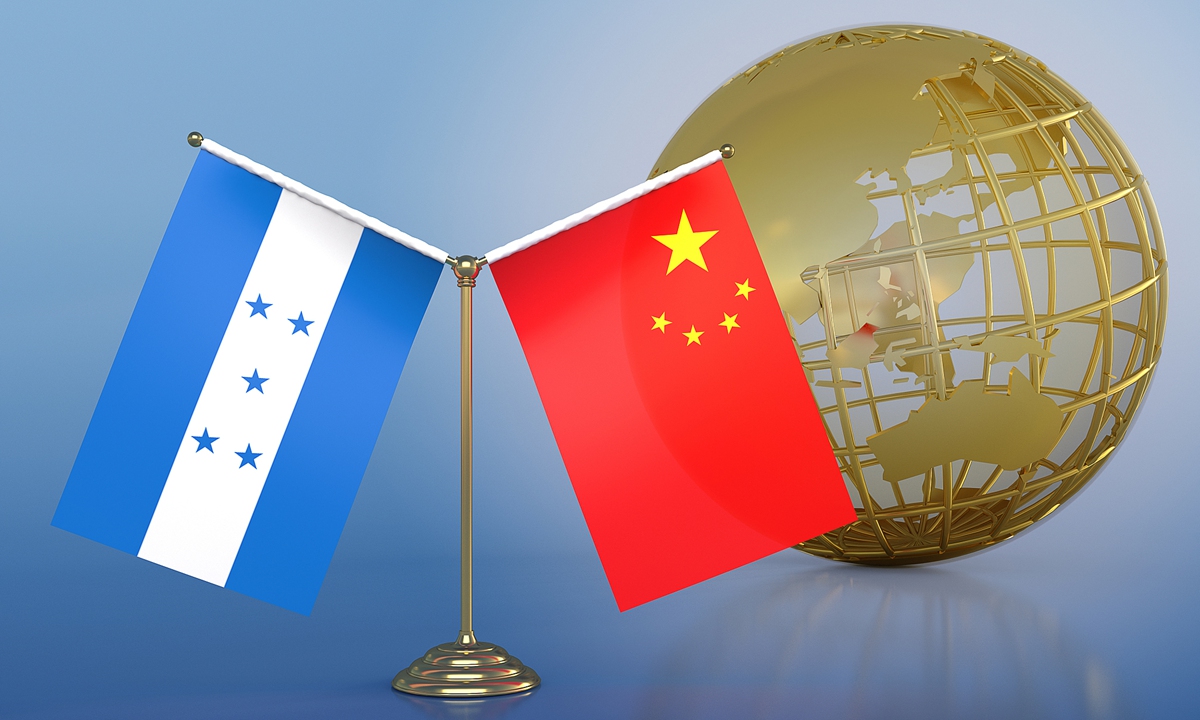By GT staff reporters
China and Honduras on Monday signed a cooperation document on jointly building the Belt and Road Initiative (BRI), vowing to strengthen coordination in their policies and development plans and deepen cooperation in various areas.
The move was particularly notable, given that it came less than three months after the two countries formally established diplomatic ties, fully reflecting their keenness to swiftly promote economic and trade cooperation, experts noted.
Cooperation with China under the BRI and other areas offers great benefits and stable and certain cooperation for Honduras and other Latin American countries that face economic challenges and external meddling, experts added.
On Monday, the two countries signed multiple bilateral cooperation documents, including one on the joint building of the BRI, according to an official statement. The cooperation documents also covered areas such as quality inspection, economic and trade issues, agriculture, science and technology, and culture and education.
A joint statement noted that the Honduran side is willing to actively participate in the BRI and the two sides will, under the BRI cooperation framework, strengthen coordination in their policies and development plans and deepen exchanges and cooperation in various areas.
Moreover, the two countries have reached a consensus on negotiating a free trade agreement and promoting practical cooperation in various fields, according to the statement. China welcomes and will provide convenience for Honduran products to enter the Chinese market, and it also encourages Chinese firms to participate in energy, environment, infrastructure, telecommunications and other projects in Honduras.
Since the two countries only established official diplomatic ties less than three months ago, such a pace in expanding bilateral cooperation fully shows that the Honduran side is eager to develop relations with China and is full of expectations for future development, Chinese experts noted.
Joining the BRI in particular could meet the needs of Honduras’ development in areas such as infrastructure and industrial capacity, Song Junying, director of the Latin America and Caribbean Department at the China Institute of International Studies, told the Global Times on Monday.
“Signing BRI cooperation documents can better promote coordination between the development strategies of the two countries and better help development in Honduras,” he said, adding that as Honduras seeks an economic recovery from the impact of the pandemic, it attaches great importance to development opportunities brought by China and is actively embracing the BRI.
In an exclusive interview with the Global Times on Sunday, Honduran Minister of Economic Development Fredis Cerrato expressed Honduras’ willingness to participate in the BRI, while rejecting Western smears against the initiative.
When asked to comment on the “debt trap” narrative in the Western media in relation to the BRI and whether it would create or exacerbate Honduras’ debt crisis, Cerrato said the initiative was beneficial to both sides. “All the decisions we make are aimed at improving the living conditions of our people.”
Experts expect swift cooperation between China and Honduras in areas such as infrastructure, including road, port and airport projects in Honduras. The two countries will also cooperate in “soft infrastructure” projects such as telecommunications networks, experts noted.
Zhou Zhiwei, an expert on Latin American studies at the Chinese Academy of Social Sciences, said that while there are many challenges and external disruptive factors, the China-proposed BRI has brought stability and certainty in terms of cooperation aimed at addressing the core issue of efficient economic development.
“As the BRI continues to deepen in Latin America, it will serve as a model for countries that have not joined, including Colombia and Brazil,” Zhou told the Global Times on Monday.
Less than two weeks before Honduras joined the BRI, China’s top economic planner announced that China and Argentina had signed a cooperation agreement on June 2 on promoting the joint construction of the BRI, vowing to deepen cooperation in areas such as infrastructure, energy, the economy and trade.
Apart from cooperation under the BRI, the vast Chinese market will offer great opportunities for Honduran products such as coffee, bananas and aquatic products. According to the joint statement on Monday, Honduras will actively use platforms such as the China International Import Expo in Shanghai to expand exports to the Chinese market.
Also on Monday, the Chinese General Administration of Customs (GAC) announced that China and Honduras signed a protocol on inspection, quarantine and other requirements for exports of Honduran aquatic products to China, which means whiteleg shrimp from Honduras can now enter the Chinese market. The GAC said that it has approved the registration of nine Honduras aquaculture firms in China, which allows them to carry out trade of whiteleg shrimp.
“We have a super-large market of global significance. So more imports from Honduras will deliver a significant boost for its economy,” Song said.













